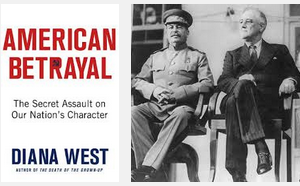The Symposium: A Day That Should Live in Infamy
Written by: Diana West
Saturday, November 16, 2013 4:49 AM ![]()

With M. Stanton Evans, Frank Gaffney, and Chris Farrell at Judicial Watch yesterday, discussing the the world inaugurated by FDR’s calamitous decision to “normalize” relations with Stalin’s genocidal regime on November 16, 1933. Steve Coughlin, also on the panel, is not pictured.
One of the things I saw in even clearer terms in preparing my remarks and listening to the other presentations was the extent to which the epic struggles over what we now quite ignorantly and even superstitiously sum up as “McCarthyism” (tossing a pinch or two of salt over the shoulder) may be seen on one level as an extended cover-up by the executive branch of the calamitous, multi-pronged impact of that 1933 decision.
Not that “McCarthyism” came up on our discussion, the presence on the panel of Stan Evans, author of the seminal book overturning decades of lies about Joe McCarthy notwithstanding. Still, FDR “normalized” relations with Stalin on the heels of the Ukraine terror famine — a genocide of approximately six million Ukrainians. In doing so, FDR not only palliated these crimes, he conferred legimitimacy on the Soviet system that perpetrated them.
Among other things — for example, I touched on the subversion of objective truth and traditional morality — this presidential act emboldened pro-Soviets, Communists, Marxists, socialists, fellow-travelers, “parlor pinks” here. More to the political point, in legitimizing Stalin’s Communist dictatorship of blood, FDR made his “New Deal” government permanently hospitable to pro-Soviets, the perfect surroundings for the scores, the hundreds of actual Soviet agents who would find their way onto the federal payroll in the 1930s. It was this secret influx into the halls and centers of power and influence of a veritable army of KGB and GRU agents and their acolytes acting in Soviet, not American interests, that came under scrutiny by our elected representatives, including Sen. Joseph McCarthy, in the years to come. The executive branch would be generally very hostile to these efforts in the House and Senate to expose the Communist conspiracy that had spread within the federal government. It was the struggle between the forces of concealment and the forces of exposure. It was American betrayal.
Rep. Martin Dies (D-TX) would later describe in his memoir how the New Deal actually worked as a Communist front organization. Of all people, Dies would know. In his tenure as chairman of the House Un-American Activities Committee, he exposed scores of Communist front organizations.
Below is a relevant section of American Betrayal in which I discuss what was, in fact, a passing moment of triumph as described by Whittaker Chambers inWitness. Chambers is writing about what would have happened if the Committee (not chaired by Dies by this time) had not gone forward with its Hiss-Chambers hearings — a real possibility at the time.
From American Betrayal, pp. 175-177
Had the committee’s investigations (the ones Truman wanted the FBI to denounce as a “red herring”) not gone forward, he [Chambers] writes,
it is probable that the forces which for years had kept the Communist conspiracy in Government from public knowledge would have continued to be successful in concealing it. Alger Hiss would have remained at the head of the Carnegie Endowment, exerting great influence in public affairs through his position and ramified connections. With him, the whole secret Communist front would have stood more unassailable than ever because the shattered sally against it had ended in ridicule and rout. Elizabeth Bentley’s charges would almost certainly have been buried in the debris.87
There is a certain irony to this statement. All the items on Chambers’s list— the successful concealment of Communist conspiracy, the influence of at least Hiss’s defenders in public affairs, the disappearance of Elizabeth Bentley’s charges—came to pass more or less despite the fact that the committee took his case forward, despite the fact that Hiss was later convicted of perjury—the ex- ception being that Alger Hiss did indeed lose his Carnegie presidency. He would rise, however, phoenix-style, as the Great Martyr of the Left. Chambers claimed victory too soon.
It’s easy to see why. At the point he was writing, he was preparing his remarkable memoirs for prestigious Random House; Alger Hiss was serving a forty-four-month prison term for perjury related to his congressional testimony against Chambers; and Richard Nixon, Chambers’s patron congressman, whom Chambers credits with steadying the resolve of the committee to continue with the Hiss-Chambers investigation, was somewhere on his meteoric rise from congressman to senator to vice president. If sweet, however, victory was short-lived. Like a submarine that got away, the Communist conspiracy resubmerged, at least in our consciousness, which is exactly where it counts; the subversive nature of Communism was reconceived as a “bugaboo” to shrug off; and the anti-Communists were subject to ridicule and rout once again and for always— and particularly Elizabeth Bentley, who, along with her charges, was definitely buried in the debris.

